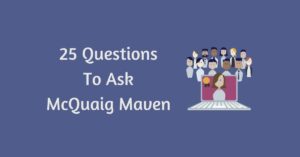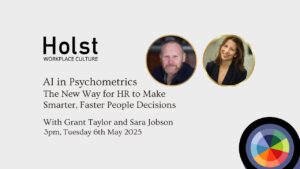Create a supportive workplace culture that allows your returners and new hires to adjust back to a new office routine.

“It’s been incredibly hard mentally for us all too and we need to be mindful of this as we start to ask people to come out of their sanctuary and return to work again. It will not be like flicking a switch back on as things we usually do after a break from work (think the long Christmas holidays and the return to work here). It’s going to be odd, challenging and different for everyone.”
Lisa Seagroatt, Founder/MD of HR Fit for Purpose
Workspace changes
There’s a good chance your workplace environment has changed in the last year. Here at Holst, the pandemic prompted an office move that better suits our needs. While some of the team have settled in at the HQ, several have yet to take the plunge. We are fortunate that we have a non-compulsive organisational culture. We had embraced remote and hybrid working well before Covid.
But those of us who can return to the office do need to take the first step towards settling in, get the Wi-Fi password and do battle with the password manager with a new IP. It’s minor functional stuff, but it nonetheless represents a psychological hurdle against returning to the work office.
Leaders need to make their employees feel welcome and safe on their return. They need to accept that there may be bumps in the road as everyone gets used to being together again. Some relationships will have to start from scratch, while others go through a re-acquaintance period. Anxiety levels may be higher than usual. But if everyone can be aware of their own and others’ responses to that anxiety, and crucially regulate their own reactions with empathy and kindness, your team will rebuild to be even stronger than they were before.
Emotional changes
A year is a long time in anyone’s life. It’s likely that some in your teams will have experienced life changing events. From births and parental leave, to bereavement and relationship breakdown, house moves and children leaving home for university, etc. In the normal way of working, we would have supported our colleagues through these changes in person. We would share the process with them, sometimes with as little as a sympathetic smile, or supporting them as they learn to cope with the upheaval.
Away from each other for a year, it’s harder to empathise over these life changing events, even though the adjustment may still be raw on return to the workplace. This is where we need to act with greater emotional awareness, especially as we may not have knowledge of our co-workers experiences of the last year. It’s important for co-workers and leaders to attend to the reactions and emotions of each other. We should regulate our own responses, especially to uncharacteristic or extreme behaviour, and bear in mind that we do not know what might be a trigger. That’s not to say ‘walk on eggshells’, but simply to be mindful, approachable and considerate.
Job changes
There’s a good chance that job roles have changed over the last year to meet the needs of a global economy in and out of lockdown. For the most part, the adjustments will be minor. But there are likely to be roles which have significantly changed.
This is an excellent time to take a fresh look at your job roles and the personality traits/skills that they require. Both flowprofiler® and McQuaig have effective tools to help organisations and leaders make objective assessments of the needs of their job roles. It’s then possible to decide whether your current team might require additional support to meet those needs or whether you should bring in a new hire to bridge the gap. You’ll also be able to grow your teams with new hires who meet the needs of the role as it is now, not what it was a year ago or more.
These changes may dent the confidence of some people, especially those who are long-standing team members. Leaders will need to work with each other and their teams to keep hold of their self-confidence so that they can sustain productivity and develop team cohesion on their return to the office.
Market changes
The changes in consumer habits and needs mean that organisations must be agile and adaptable to satisfy them. This is different to impulsive knee-jerk reactions. Instead organisations should be ready to react to immediate demands and opportunities, and also be able to sustain that activity.
This relies on strong team relationships and a long-term growth strategy that has the capacity to stretch and contract when required. Organisations should avoid their employees suffering from burnout or excessive stress during regular working activity so that they have the room to stretch when it really matters. It also means that organisations must protect jobs by not over-hiring if the demand suddenly drops. It’s a fine line to tread.
flowprofiler® dimension labs
Understand more about emotional awareness, emotional regulation, self-confidence and regard for others in our upcoming series of flowprofiler® dimension labs.
Reflect on and develop your personal effectiveness across emotional intelligence, resilience and motivation with flowprofiler® dimension labs. Each one hour virtual flowprofiler® dimension lab focuses on a single dimension. The session explores that dimension and how it manifests in behavioural terms.
- Emotional Awareness 27 May 2021
- Emotional Regulation 10 June 2021
- Self-Confidence 24 June 2021
- Self-Esteem 6 July 2021
- Regard for Others 20 July 2021
Register your interest for upcoming flowprofiler® dimension labs here:
flowprofiler® and associated marks are registered trademarks of Chalmers International Limited | All rights reserved
eqflow® and associated marks are registered trademarks of Chalmers International Limited | All rights reserved
resilienceflow® and associated marks are registered trademarks of Chalmers International Limited | All rights reserved
motivationflow® and associated marks are registered trademarks of Chalmers International Limited | All rights reserved





